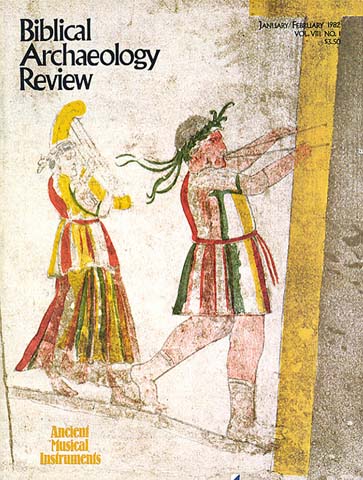Biblical Archaeology Review, January/February 1982

Features
Ancient musical instruments is the theme—with variations—of this special section. Even before people invented writing they used music to accompany their ceremonies and the express their feelings.
Archaeologists are gradually recovering the remains of musical life from ancient Israel. More than three hundred remains of actual instruments and representations of musical scenes have been recorded. The dates of these items range from late pre-history to the Byzantine period, including a sizable number within the span from Biblical to Second Temple times, […]
“The spirit of Yahweh had forsaken Saul, and at times an evil spirit from Yahweh would seize him suddenly. His servants said to him, ‘You see, sir, how an evil spirit from God seizes you; why do you not command your servants here to go and find some man who can play the harp? […]
A cow’s foreleg with six holes was illustrated in color in “Digging in the City of David,” BAR 05:04. Archaeologists identified the perforated bone as a flute; by blowing into the hollow bone and covering different holes, different notes could be produced. The bone flute, recovered from a destruction level of the first century […]
No New Testament passage is better known than Chapter 13 of Paul’s first letter to the Corinthians. Its singular lyrical felicity and its insistence upon love differentiates it from the often practical and pragmatic side of Paul’s mind. This ode to love begins (in the King James Version): “If I speak in the tongues […]
Many people do not realize that archaeology is destructive. Unlike experiments in physics or chemistry, which can be repeated in the lab, once a site has been excavated it cannot be re-excavated. The archaeological remains are gone forever from their position in the earth. Therefore, the key word for the archaeologist is CONTROL. The […]
Except in Woody Allen movies, there are no “man-in-the-street” brain surgeons. No journal that I know of invites its readers to spend two weeks as volunteer atomic physicists. It’s different with archaeology. From the very beginning, the amateur was a key figure. Heinrich Schleimann, who revealed the treasures of ancient Troy in the 1870’s […]
Diving to recover Herodian columns from Caesarea’s harbor, breaking ground at a new dig in Jordan, restoring a Middle Bronze (22nd–16th century B.C.) “mansion” in the Sharon Plain—these are a few of the excavation opportunities for volunteers in 1982. A dig provides the chance to live with other volunteers from many parts of the […]
How the ancient history of Syria was “faked” was the subject of a recent symposium held in Damascus. The following article is based on an account of the symposium in the English-language Syria Times.
